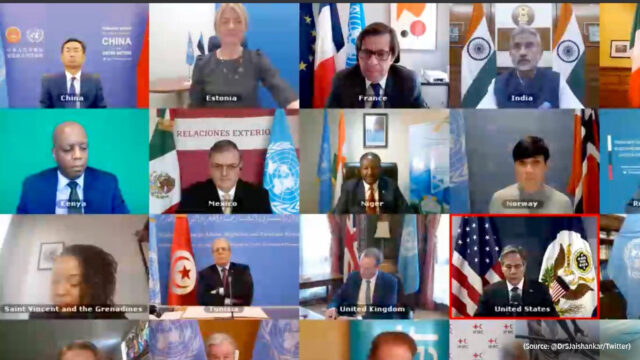External Affairs Minister of India Dr S Jaishankar urged countries to “stop vaccine nationalism” and “actively encourage internationalism”. He was speaking at the UNSC Open Debate on the Implementation of Resolution 2532 (2020) hosted by the United Kingdom (UK).
Dr Jaishankar outlined nine points to tackle and put the COVID-19 pandemic behind. He also highlighted that India has been at the forefront of the fight against COVID-19 pandemic. India has provided critical medicines, diagnostic kits, ventilators and PPEs to more than 150 countries. Of these, 80 countries have received medical equipment and vaccines on a grant basis.
India has been very much at the forefront of this global fight against COVID-19 pandemic. We had earlier provided critical medicines, diagnostic kits, ventilators and PPEs to more than 150 countries, about 80 of them on a grant basis. Today, the pharmacy of the world is stepping forward to meet the global vaccines challenge.
India has granted emergency authorization to two vaccines and one of them is indigenously developed.
Under Vaccine Maitri (Vaccine Friendship) initiative, India has provided vaccines to many countries. In addition to being a significant source of supply to the COVAX facility, India is also directly sending vaccines to many countries including neighbours. 25 nations across the world have already received Made in India vaccines and 49 more countries will be supplied in the coming days. The Made In India vaccines are being supplied to nations from Europe, North America, Latin America, the Caribbean to Africa, South-East Asia and the Pacific Islands. Dr Jaishankar also announced a gift of 200,000 doses for UN peacekeeping missions.
India is working with Global Alliance for Vaccines and Immunisation (GAVI), World Health Organisation (WHO) and Access to COVID-19 Tools (ACT) Accelerator. India has also contributed to the SAARC COVID-19 Emergency Fund.
Dr Jaishankar highlighted India’s five concerns in his speech. First concern he underlined was on global coordination regarding vaccine distribution and its effect on the poorest countries. He said, “lack of global coordination regarding vaccine distribution will hit conflict affected areas and poorer countries hardest.” According to the International Committee of Red Cross (ICRC) more than 60 million people in such areas are at risk. His second point highlighted “glaring disparity in accessibility of vaccines globally”. In the third point he highlighted the need for cooperation within the framework of COVAX, and trying to secure adequate vaccine doses for the world’s poorest nations. He further voiced concerns over the economic burden of inequitable vaccine distribution. According to the International Chamber of Commerce, the global economy stands to lose as much as US$9.2 trillion if the international community fails to address vaccine inequity. Lastly, he warned that routine immunization programmes have been thrown into disarray which puts about 80 million children in at least 68 countries at risk of diphtheria, measles, and polio.
The nine points outlined by Dr Jaishankar “to put the Covid-19 pandemic decisively behind” and “collective consideration” are as follows:
- Persist with the vaccination drive, along with other public health measures, to slow down the virus’s ability to infect new people and mutate further.
- Collaborate with each other on genomic surveillance to track virus mutations and variants and exchange information in this regard in a regular and timely fashion.
- Effectively address public resistance to vaccines. Vaccine-related information must be contextual, empathetic, and culturally sensitive, while providing scientific and accurate facts to allay the fears and concerns of the public.
- Improve public health infrastructure and build capacity through effective training programmes in vaccine delivery, especially in areas where health infrastructure is weak.
- Stop ‘Vaccine nationalism’; indeed, actively encourage internationalism. Hoarding superfluous doses will defeat our efforts towards attaining collective health security.
- Strengthen the COVAX facility to ensure equitable distribution of vaccines to all in a fair and equitable manner.
- Urgently resume immunization programs across the world before children’s lives are threatened by other diseases. We simply cannot trade one health crisis for another.
- Stop disinformation campaigns taking advantage of this pandemic to advance their nefarious objectives and activities.
- Proactively prepare for the next global pandemic by focusing on improving capacities, developing protocols, and building a knowledge base and expertise.









